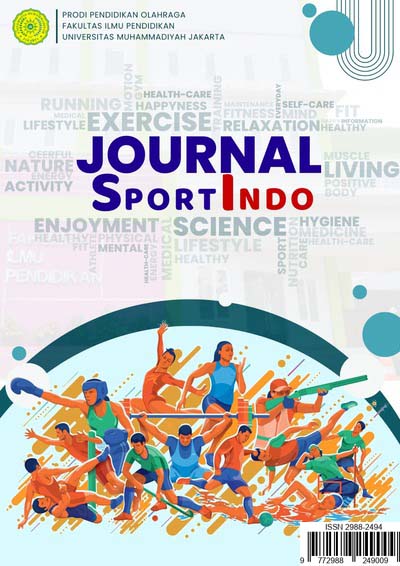PENGARUH LATIHAN PASSING MENGGUNAKAN TARGET TERHADAP HASIL AKURASI PASSING DALAM PERMAINAN FUTSAL PESERTA DIDIK EKSTRAKULIKULER SMK SETIA NEGARA
Main Article Content
Abstract
This writing is motivated by the results of students' badminton training that have not been maximized, so researchers are moved to examine what causes the results of passing exercises that have not been maximized and put forward improvements by using target passing exercises. The purpose of this study was to determine the effect of targeting passing exercises on the results of passing accuracy in futsal games for extracurricular students at Setia Negara Vocational School, when participating in extracurricular activities. The technique used is an experimental model, and the hypothesis is the result of the passing accuracy of the futsal extracurricular students at Setia Negara Vocational School who are influenced by target passing exercises. The results of the calculations which show the calculation of the t-test -3.058 > -t table -0.000 and a significance of 0.0001 > 0.05, clearly shows that there is no significant difference in the results of the accuracy of passing futsal extracurricular students at SMK Setia Negara using passing exercises target. Thus it can be said that passing exercises use targets for the results of passing accuracy in futsal games for extracurricular students at SMK Setia Negara. Principals, teachers, parents and students, as well as future researchers, are expected to benefit from the findings of this study. Key words: Passing Using Target, Accuracy Results
Article Details
Section
Articles
Authors who publish with this journal agree to the following terms:
- Authors retain copyright and grant the journal right of first publication with the work simultaneously licensed under a Creative Commons Attribution License that allows others to share the work with an acknowledgement of the work's authorship and initial publication in this journal.
- Authors are able to enter into separate, additional contractual arrangements for the non-exclusive distribution of the journal's published version of the work (e.g., post it to an institutional repository or publish it in a book), with an acknowledgement of its initial publication in this journal.
- Authors are permitted and encouraged to post their work online (e.g., in institutional repositories or on their website) prior to and during the submission process, as it can lead to productive exchanges, as well as earlier and greater citation of published work (See The Effect of Open Access).

